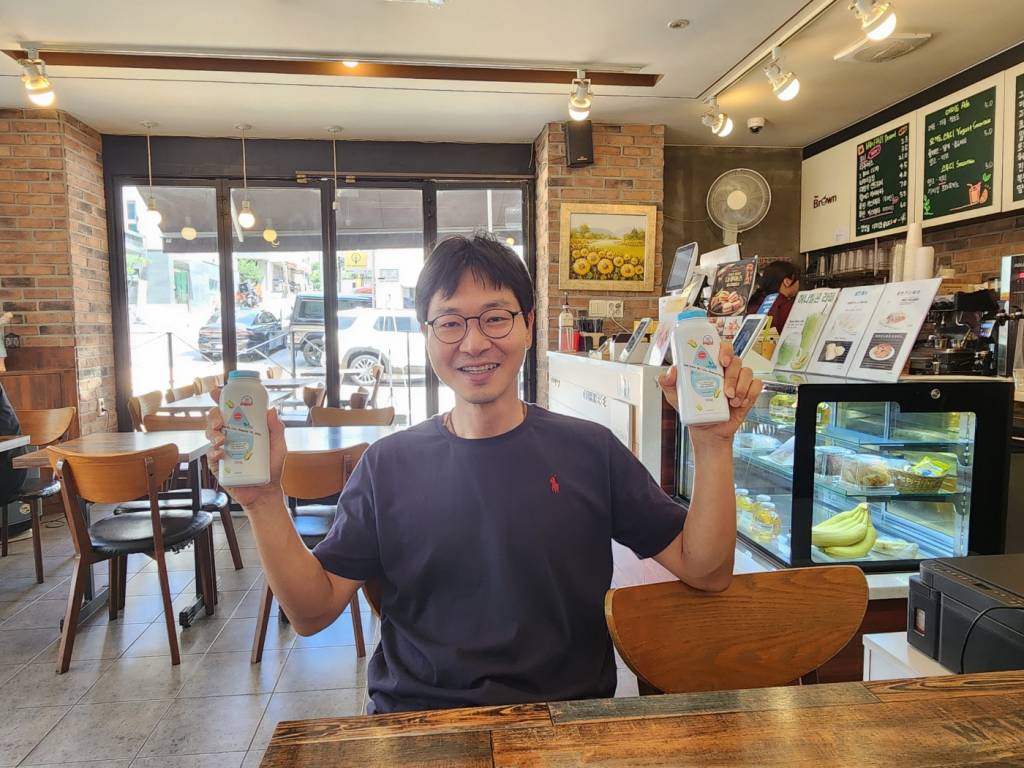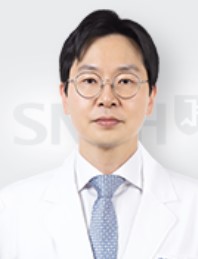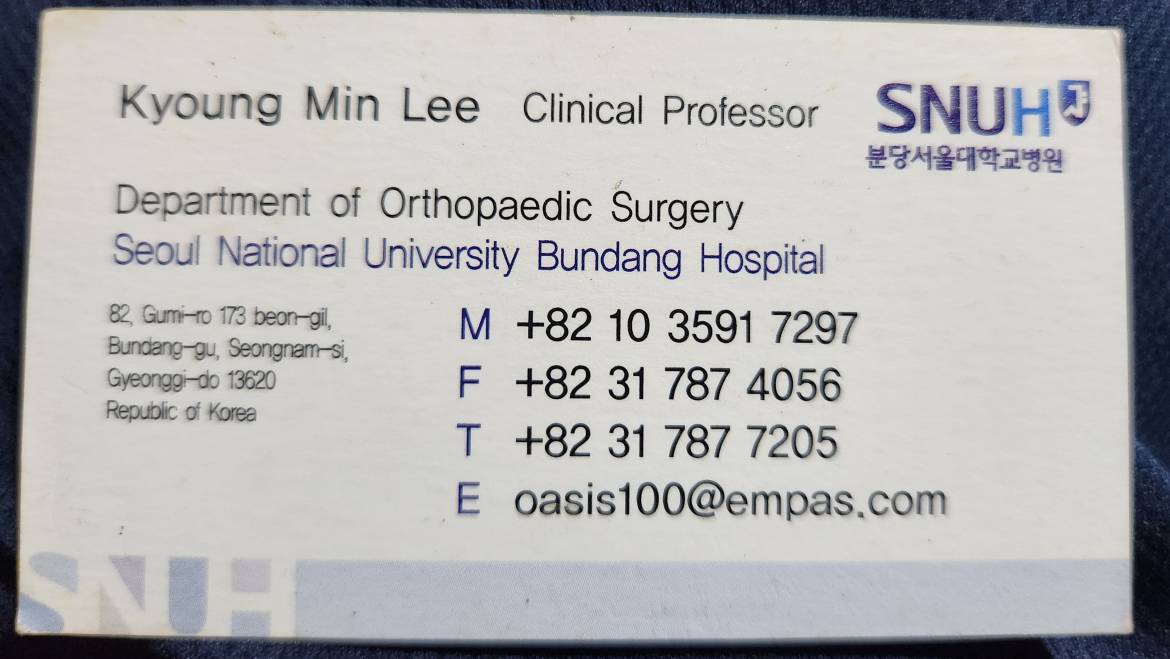You can find us every Saturday afternoon down the street at Tiny Brown or Banapresso, engaged in an animated discussion or reviewing some article from my website. My coffee-shop companion is Dr. Lee Kyoung-min. Earlier this year he answered an ad I had placed on Craigslist offering English conversation classes. It has been, we both agree, a successful and enjoyable endeavor. Although he speaks the international language quite well, he wanted to enhance communication with his medical colleagues from other countries, primarily those in the USA and Europe. I cannot help being a respecter of credentials—of which he has an M.D., a master’s and a Ph.D., all from Seoul National University, the country’s finest educational institution—and for this and other reasons I hold him in high regard. Dr. Lee, whose subspecialty is foot and ankle surgery, works in the Department of Orthopedic Surgery at SNU Hospital in the suburb of Bundang. For a man of just 49 summers, he has done a lot.
A native of Chuncheon in Gangwon Province, he was the youngest of three children born to Lee Joong-gyu (father) and Ham Hong-ja (mother), both of whom were educators—as was one of his grandfathers. To their credit, they treated him no better than his two older sisters, Mi-young and Yoon-kyoung. Just one generation earlier, Korean parents shamelessly favored sons over daughters, and we can be glad such an attitude is over and done with. Mr. Lee and Ms. Ham have every right to be proud of this trio; Mi-young is a graduate of Ewha Womans University and teaches at a local elementary school, whereas Yoon-kyoung has a degree in Turkish from Hankuk University of Foreign Studies and worked as the secretary of the CEO of a large conglomerate before becoming a housewife.
In 2003, while doing his residency, Dr. Lee—I simply cannot call him “Kyoung-min”—married Park Hye-jung. She is employed as a middle-school art teacher. They have one child, a 20-year-old daughter named Joo-won. I had a chance to meet this SNU pharmacy student once, and her English is such that I felt like I was talking to an American college girl, not a Korean college girl. Benefitting from the year in which her father was doing a sabbatical at UC San Diego, she seems to be 100% bilingual.
Dr. Lee diagnosed the Dupuytren’s contracture that has afflicted the middle finger of my right hand for the past year or so. Although he is a foot-and-ankle specialist, he has a broad understanding of the workings of the human body. And wrists, hands and fingers have a lot in common with ankles, feet and toes. That being the case, he has kindly advised me on treatment of this condition and answered all of my questions.
I do not mean to imply that Dr. Lee is perfect. In our many talks, I have often realized that he cannot be called historically aware. He responds with a sheepish smile every time that becomes apparent. We both know why—he has had to focus so completely on medicine that he could hardly think of anything else.
For two reasons, Dr. Lee’s parents originally wanted him to become an engineer. First, they thought that medicine might be too difficult (they clearly underestimated him). And second, they feared that the time and energy demands on a doctor would be so severe as to preclude him from having any semblance of a balanced life. As he worked his way up from medical student to resident to clinical fellow to clinical assistant professor to clinical associate professor to his present status as full clinical professor, Dr. Lee worked absurdly long hours and had scant opportunity to relax with his wife, daughter, sisters, parents and friends. To do otherwise, however, would have kept him from rising so high; he was willing to make those sacrifices. He is now able to be with them more often and indulge his passion for golf and tennis—although he remains quite busy teaching, attending academic conferences, doing research (he is the author or co-author of nearly 190 scholarly articles [with such titles as “Postoperative Stability in Displaced Ankle Fractures with Concomitant Ligamentous Injuries” and “Long-term Outcomes over 10 Years after Femoral Derotation Osteotomy in Ambulatory Children with Cerebral Palsy”]) and handling administrative duties, not to mention performing surgery on the feet and/or ankles of his patients. He is a member of 7 professional organizations, he has won 5 awards, and his CV runs 24 pages.
In our classes at Tiny Brown and Banapresso, we have covered a whole constellation of topics, including women, sports, real estate, American culture, my journalistic achievements and the variegated problems plaguing this country. One we have discussed over and over again, with which he is deeply involved, is the current impasse between the government (by which I mean the Yoon Seok-yul administration) and the medical profession. It is a complicated matter, and one I do not fully understand. It seems that in February, Yoon set off a crisis by proposing to raise the number of Korean doctors by 2,000 per year starting in 2025, about a 70% increase. This has created havoc affecting patients, medical technicians, nurses, doctors and administrators. Surgeries have been postponed or canceled—some deaths have resulted—doctors have resigned, more than 90% of residents have gone on strike, medical students have changed career plans, and large university hospitals like SNUH are being financially stressed.
Yoon, a political novice, has committed numerous other blunders during his presidency, but none bigger than this. He was not wrong in saying that there is a shortage of doctors, as Korea’s 52 million residents have only 2.6 of them per 1,000 people, well below the average of 3.7 for OECD countries. We need more docs. But any increase must proceed slowly and incrementally; otherwise, the quality of medical education and medical care is almost certain to decline. Yoon’s proposal is flawed, as he has been informed by many people, but he refuses to alter it.
The personable and even-keeled Dr. Lee does not seem optimistic about getting a resolution any time soon. It sounds rather alarmist, but in his opinion the Korean health care system (which I regard as the best in the world in terms of low cost, high quality and ease of access) is in danger of collapse within the next two years. Rebuilding will be expensive and difficult, and even then it is unlikely to return to its former eminence.

Dr. Lee at Tiny Brown…

A solemn-looking Dr. Lee…


4 Comments
Dr. Lee’s commitment and dedication is admirable.
I don’t understand why politicians would impede future generations healthcare needs. So many students of medicine would benefit greatly.
Lee, I sure do agree with you about Dr. Lee. As for Yoon, he is a stone-cold fool!
Dr. Lee sounds like quite an interesting man. One who inspires confidence in his patients.
He sure is, King David. I admire him a lot. One thing I did not mention here is that he is humble and the very opposite of pretentious. Never has he tried to big-time me or impress me with his accomplishments.
Add Comment